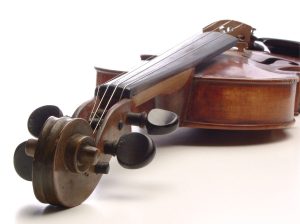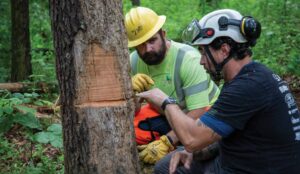A simple inquisitive journey, a burning desire to learn more about his own heritage and a very timidly spoken “bonjour” led Dennis Stroughmatt down a path of self-discovery and into the role of standard bearer for a little-known culture and its unique music.
Growing up in the Edwards County community of Albion he still calls home, Stroughmatt was fascinated by the centuries-old French influences that spanned from Vincennes, Ind., through Illinois and into the historic river towns on both sides of the Mississippi — places with names such as Cahokia, Kaskaskia and Prairie du Rocher, Ill., and Saint Genevieve and Old Mines, Mo. He was eager to learn more.
Even as a youth, he inquired to a staff member at one of the historic sites in Vincennes, “What about the French?” only to get a quick response of, “They’re in the cemetery.” It was not until years later when he asked the same question to one of the professors in the historic preservation program at Southeast Missouri State University (SEMO) where he was a student that he gained insight. This professor did more than answer, he sent his student up the road to towns along the Mississippi that held tight to Creole traditions.
Stroughmatt went looking for the places and people where French was still a native tongue. He found the right people: a group of older women in Old Mines sitting on a porch. He greeted them with the French word for hello.
“They responded to me in French, but it was not any French I’d ever heard, and I was blown away,” Stroughmatt recalls. “I told them I wanted to learn more about them, their community and my own heritage.”
Like many of the places first settled by the French, the women spoke a hybrid style or regionalized version of French, one that differs even from the language spoken in Canada or in the lower Mississippi delta, and from that spoken in France.
“The language comes from experiences and the area in which they live. That is why the Illinois French language is unique. It’s a distinct dialect with differences in words or in pronunciations, for example,” he says.
 Stroughmatt became a frequent guest on that porch and others in the area throughout his time at SEMO and later as a graduate student in history at nearby Southern Illinois University Carbondale. He was invited to weekly “bouillons” or house parties where the French was flowing, the traditions still held true and where he found the music riveting. Fascinated by what he was learning of the culture and folklore of the area, he began to learn the variation of French spoken by residents and, as a novice violin player, became enamored with their fast-tempo, fiddle-driven tunes passed down through generations.
Stroughmatt became a frequent guest on that porch and others in the area throughout his time at SEMO and later as a graduate student in history at nearby Southern Illinois University Carbondale. He was invited to weekly “bouillons” or house parties where the French was flowing, the traditions still held true and where he found the music riveting. Fascinated by what he was learning of the culture and folklore of the area, he began to learn the variation of French spoken by residents and, as a novice violin player, became enamored with their fast-tempo, fiddle-driven tunes passed down through generations.
He started to learn the music from Roy Boyer and Charlie Pashia, a pair of longtime French Creole fiddlers, and he was a quick study in both the genre and other musical styles. The more he learned and played, the better he became.
As he immersed himself in all things Creole, he fell in love with the culture and wanted to share three centuries of traditions and music with others.
“My preservation efforts for the last 33 years have really been in Illinois, Missouri and Indiana French Creole music,” Stroughmatt says, explaining that the music — often known simply as “French Creole” or “Illinois French Creole” — stems from the area first inhabited by French settlers in the early 1700s and known as the “Illinois Country.”
The music is different from the better-known Louisiana-inspired Creole. “French Creole music is fast — very fast,” Stroughmatt says. To play the fiddle tunes, he uses what is called a “front-bowing” style, a technique that lends itself to faster playing. “You only use a small portion of the bow, maybe three or four inches,” he explains. “That means our jigs have a tendency to be fast.”
He said the musical style has stayed mostly the same for generations.
“Our Creole was not ever recorded or experimented with, it was just kept at home, so to speak, so it just survived,” he said.
Stroughmatt made his own recordings to listen to and practice with. As he grew as a fiddle player, he found his own roots as well as his passion. Others saw it, too. In the late ’90s, his mentors — the ones who had taught him the music — passed the baton to their student.
“Roy came to me and said, ‘Look, I’m getting too old to play all of the festivals. I need you to take over.’ I told him I really didn’t know what I was doing, and he told me I knew more than anybody else. At the time, I hadn’t even finished my master’s degree, and I didn’t really think about what was happening.”
In retrospect, Stroughmatt realizes that he was becoming an ambassador for the culture and the music. He made quality studio recordings of
the music to preserve it. He also began getting calls to do programs on Illinois French Creole music and culture from groups including the Missouri Humanities Council and the National Endowment for the Humanities.
“It was truly at that point in my life when I spent three or four years doing these programs, introducing people to the French music that they knew nothing about, that I realized, ‘I guess I am the ambassador for this.’ I had never really thought of myself that way, but I realized that it was just me and my group (L’Esprit Creole) going out and playing and sharing this music,” he says.
Today, Stroughmatt’s resume includes teaching about the Illinois French people and culture as well as their music at festivals and seminars throughout the nation, including events for the American Association of Teachers of French, National Public Radio, The Library of Congress and the Kennedy Center. Now a recognized expert fiddler, Stroughmatt is a sought-after Creole, Cajun, Western swing and old-time country fiddle player. In fact, he has been inducted into the National Oldtime Fiddlers Hall of Fame.
 He is a frequent fiddler for old-time country performances, and when not performing Illinois French Creole, he and his other band, called Creole Stomp, play Zydeco and Louisiana Cajun Creole. His heart, however, remains in the “Illinois Country,” and he reflects on the gravity of the efforts to preserve its culture and music.
He is a frequent fiddler for old-time country performances, and when not performing Illinois French Creole, he and his other band, called Creole Stomp, play Zydeco and Louisiana Cajun Creole. His heart, however, remains in the “Illinois Country,” and he reflects on the gravity of the efforts to preserve its culture and music.
“It really, truly started that day on the porch in Old Mines, Mo.,” he says. “I realize, wow, what if I hadn’t talked to that professor, what if I hadn’t stepped on that porch 33 years ago?”
Longtime friend Jason Duensing of Prairie du Rocher, Ill., understands the importance. “If it wasn’t for what Dennis is doing,” Duensing declares, “I think — to use a cliché — the music would die on the vine. It just wouldn’t be preserved and passed down.”
Stroughmatt says the music is his calling. “For some reason that I still don’t understand, I was put in a place to learn it, and so, that’s why, as long as I live, I will continue to play this music, work to preserve it, try to propagate it and teach it to people as much as I can. Something put me there, and I’ll never question that.”










